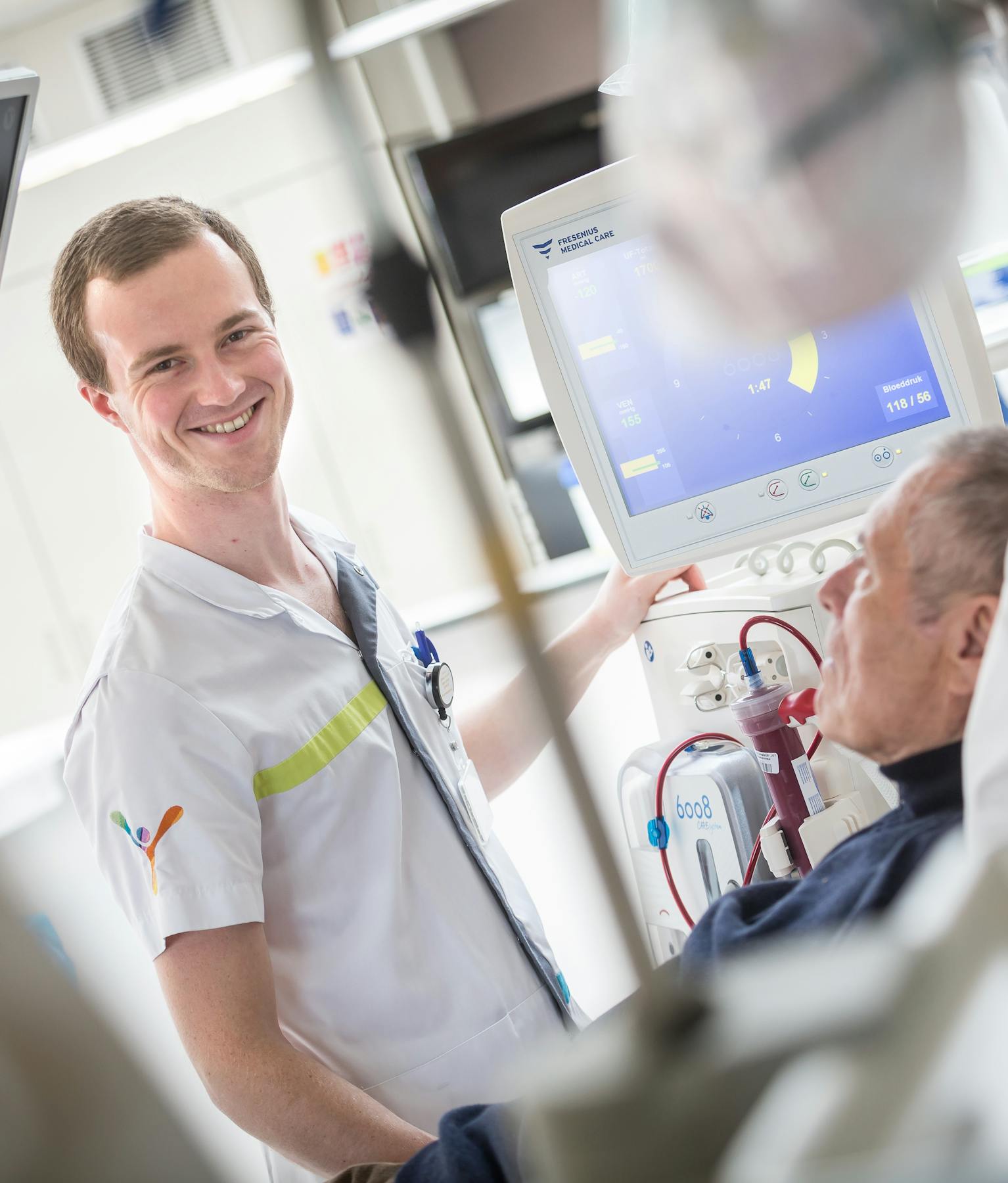
More information about haemodialysis is available below.
For this treatment you have to come to the hospital three times a week. During a morning or afternoon, an artificial kidney will purify your blood.
The blood can be supplied to the dialysis machine in two ways:
During dialysis you sit in a comfortable chair or lie in bed. You have an individual TV or radio. There is also access to the internet. You will receive individual, customised, high-quality treatment in a modern centre with up-to-date equipment. You are surrounded by expert nursing staff, supervised by the team of nephrologists. We also rely on dieticians and social nurses.
The dialysis treatment is fully reimbursed.
The advantages of chronic haemodialysis in a dialysis centre are:
With the diagnosis of acute severe renal failure, there is sometimes a need for acute dialysis. This treatment can be carried out in the Intensive Care Unit or, after stabilisation of the patient, in the haemodialysis unit.
The choice of technique for acute dialysis is determined in consultation between the nephrologist, the physician intensivist and cardiologist.
Plasmapheresis is indicated in the treatment of some rare diseases.
During a plasmapheresis treatment the patient's own plasma is exchanged with other fluids.
You can also have haemodialysis at home, but is only possible if you have a stable dialysis.
There are a number of reasons for choosing home haemodialysis:
Before starting home haemodialysis, you will first receive a training, which will last about two months.
All the necessary materials to do the treatment at home in the best conditions are provided by the centre and delivered to the patient's home. The direct costs of dialysis are reimbursed by the health insurance fund and settled directly with the hospital (so the patient does not have to pay for the equipment and use of the device).
Every six weeks a blood sample is taken and your medical condition is discussed with your nephrologist.
Are you interested in starting home dialysis? In that case, contact your nephrologist.
Some disadvantages may be that you have to do the dialysis alone at home. However, there is always a standby service available in case of technical problems, and a standby service from the hospital for medical problems. You also need some space to store the material and the device.
This means that the patient is dialysed in the hospital (at the dialysis department), but is partly responsible for his/her treatment. Self-care is therefore a nice compromise between home dialysis and haemodialysis at the hospital.
Preferably you are in a relatively healthy condition, i.e. no major diseases or disorders in addition to your dialysis treatment. Furthermore, you are motivated to take on a shared responsibility. And you show a genuine interest in the training you are offered.
This training takes one to two months, depending on the individual. You learn what dialysis treatment involves, how to set up a machine, what alarms you may be confronted with and how to solve them... This is all based on a fully developed course and close guidance from the nursing staff.
Some reasons to choose self-care dialysis:
Holidays and dialysis go perfectly together in our region. You can have the dialysis in Ypres and our Centre for Autodialysis in Veurne.
You are welcome at our centre for chronic haemodialysis.
Interested parties can download the application form below.
Please return the completed form to the centre where the request was made at least one month before the first holiday dialysis.
In the dialysis centre of the Jan Yperman Hospital, the possibility of dialysing at night has existed since the beginning of October 2017.
To be a candidate, you must first and foremost be motivated and have no medical contraindication for night dialysis. The intention is to help professionally active patients in the first place, but other patients can certainly be considered as well.
The decision is made by the nephrologists.
There are 10 places available at night for dialysis patients according to a fixed schedule on Monday, Wednesday and Friday nights.
Nocturnal haemodialysis takes on average 8 hours. Patients are expected to report for dialysis between 21 and 22 hours. Two dialysis nurses are present at night.
The advantages of nocturnal dialysis are a better quality of life and better control of phosphorus, which makes the diet less strict, allows medication to be tapered off frequently and reduces the risk of arteriosclerosis. Fluid removal can also be slower, resulting in less frequent cramps and drops in blood pressure. Often, blood-pressure-lowering medication can also be reduced.
There are also psychosocial benefits: because dialysis takes place during sleep, time is freed up during the day for study, work or family activities.
A disadvantage may be that your sleep is impaired during the nocturnal dialysis.

More info
For additional information and questions, please contact the dialysis head nurse or one of the deputy managers on phone number 057 35 61 41 on weekdays between 8 a.m. and 5 p.m.